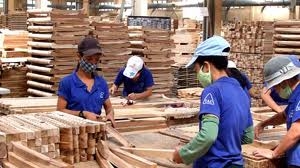Exports to prove a bridge too far
 Ho Chi Minh City-based Saigon Garment Company 3 saw export values reach VND1.5 trillion ($71.4 million) in the first three quarters of 2012, tantamount to last year’s corresponding period, but profits shed 50 per cent on the back of escalating input costs, according to the company’s general director Pham Xuan Hong.
Ho Chi Minh City-based Saigon Garment Company 3 saw export values reach VND1.5 trillion ($71.4 million) in the first three quarters of 2012, tantamount to last year’s corresponding period, but profits shed 50 per cent on the back of escalating input costs, according to the company’s general director Pham Xuan Hong.
Binh Hoa Garment Company witnessed a 20 per cent decline in export orders in remaining months of the year compared to one year ago, said its director Phung Dinh Ngo.
Big players in the garment sector like Thang Loi Company also eyed sagging profits against rising revenue figures compared to last year’s same period.
The Ministry of Industry and Trade’s first nine month periodical report showed that some major export groups like the textile-garment, footwear, wooden furniture posted lower growth versus the country’s average, showing firms’ difficulties in sourcing export markets.
Shedding some light on why garment export markets are often less vibrant at year-end period compared to other time in the year Hong said importers from EU, Japan and the US often place rising orders based on seasons but do not abruptly increase orders in the lead to festive or New Year occasions.
“Our customers from Europe are shifting into placing orders with Cambodia to benefit from zero per cent tax policies in this country, making Vietnamese firms less competitive in securing export orders with regional peers,” said Ngo.
Ngo added that it is hard for small firms to step into the Japanese market due to stringent quality requirements placed on imports. To meet such requirements, firms needed to invest in cutting-edge equipment which is beyond their financial capacity.
Hong said firms had turned to competent management agencies for several proposals to help them get through this tough period but the outcome remains modest.
For instance, garment exporters proposed the Ministry of Finance not abolish the 275-day tax grace policy for imported materials, but a final decision has not been made.
“Since firms are struggling on the back of current woes, using the year-end period to boost production remains almost impossible,” said Ngo.
Firms assumed the government should increase support through tax vehicle like reducing corporate income tax from 25 to 20 per cent or lowering value added tax to 5 per cent to get firms out of difficulties, from there enabling them to expand scope or accelerate production.
What the stars mean:
★ Poor ★ ★ Promising ★★★ Good ★★★★ Very good ★★★★★ Exceptional
Related Contents
Latest News
More News
- MAE names big 10 policy wins in 2025 (February 06, 2026 | 08:00)
- US firms deepen energy engagement with Vietnam (February 05, 2026 | 17:23)
- Vietnam records solid FDI performance in January (February 05, 2026 | 17:11)
- Site clearance work launched for Dung Quat refinery upgrade (February 04, 2026 | 18:06)
- Masan High-Tech Materials reports profit: a view from Nui Phao mine (February 04, 2026 | 16:13)
- Hermes joins Long Thanh cargo terminal development (February 04, 2026 | 15:59)
- SCG enhances production and distribution in Vietnam (February 04, 2026 | 08:00)
- UNIVACCO strengthens Asia expansion with Vietnam facility (February 03, 2026 | 08:00)
- Cai Mep Ha Port project wins approval with $1.95bn investment (February 02, 2026 | 16:17)
- Repositioning Vietnam in Asia’s manufacturing race (February 02, 2026 | 16:00)

 Tag:
Tag:




















 Mobile Version
Mobile Version